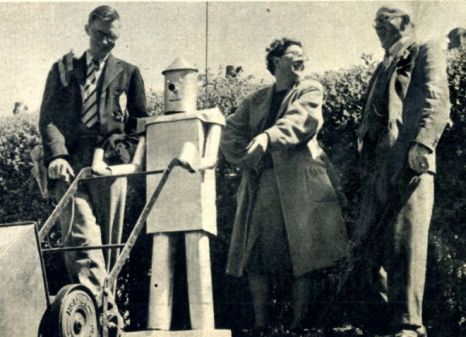Whether we’re talking about baseball umpires or long-haul truckers, I’m not so concerned about machines ruining the “romance” of traditional human endeavor, but I am very worried about technological unemployment destabilizing Labor. Perhaps history will repeat itself and more and better jobs will replace the ones likely to be disappeared in the coming decades, but even just the perfection of driverless cars will create a huge pothole in society. The Gig Economy is a diminishing of the workforce, and even those positions are vulnerable to automation. Maybe things will work themselves out, but it would be far better if we’re prepared for a worst-case scenario.
Excerpts from two articles follow: 1) Mark Karlin’s Truthout interview with Robert McChesney, co-author of People Get Ready, and 2) a Manu Saadia Tech Insider piece, “Robots Could Be a Big Problem for the Third World.”
From Truthout:
Question:
Let me start with the grand question raised by your book written with John Nichols. I think it is safe to say that the conventional thinking of the “wisdom class” for decades has been that the more advanced technology becomes (including robots and automated means of production, service and communication), the more beneficial it will be for humans. What is the basic challenge to that concept at the center of the new book by you and John?
Robert W. McChesney:
The conventional wisdom, embraced and propagated by many economists, has been that while new technologies will disrupt and eliminate many jobs and entire industries, they would also create new industries, which would eventually have as many or more new jobs, and that these jobs would generally be much better than the jobs that had been lost to technology.
And that has been more or less true for much of the history of industrial capitalism. Vastly fewer people were needed to work on farms by the 20th century and many ended up in factories; less are now needed in factories and they end up in offices. The new jobs tended to be better than the old jobs.
But we argue the idea that technology will create a new job to replace the one it has destroyed is no longer operative. Nor is the idea that the new job will be better than the old job, in terms of compensation and benefits. Capitalism is in a period of prolonged and arguably indefinite stagnation.•
From Tech Insider:
The danger lies in the transition to an economy where the cost of making stuff—industry—has become more or less like agriculture today (with very few people employed and a very low share of GDP). With appropriate policies in place, developed countries can probably manage that transition. They have in the past, and therefore it is safe to assume they most likely will in the future. It does not mean that we will not experience dislocations and conflicts, but we do have old and established institutions—government, the press, the public sphere— that allow us to resolve such conflicts over time for the greater benefit of all.
The real challenge will be beyond our comfortable borders, in the developing world. In both nineteenth-century Europe and twentieth-century Asia, national development has followed a similar pattern. People moved from the countryside to urban centers to take advantage of higher-paying jobs in factories and services. Again, South Korea offers a startling, fast-forward example of that: it underwent a complete transformation from a poor, rural country to a postindus trial, hyperurban powerhouse in less than fifty years. It was so rapid that most visible traces of the past have been erased and forgotten. The national museum in Seoul has a life-size reconstruction of a Seoul street in the 1950s, just like we have over here, but for the colonial era. And imagine this, China went down that very same path at an even faster clip. Half a billion impoverished people turned into middle-class consumers in three decades.
However, this may not happen again if manufacturing is reduced to the status of agriculture, a highly rationalized activity (read: employing very few people). The historically proven path to economic growth and prosperity taken by Korea and China might no longer be available to the next countries.•

